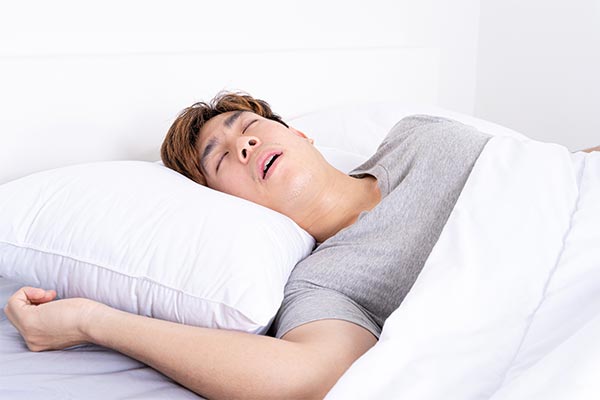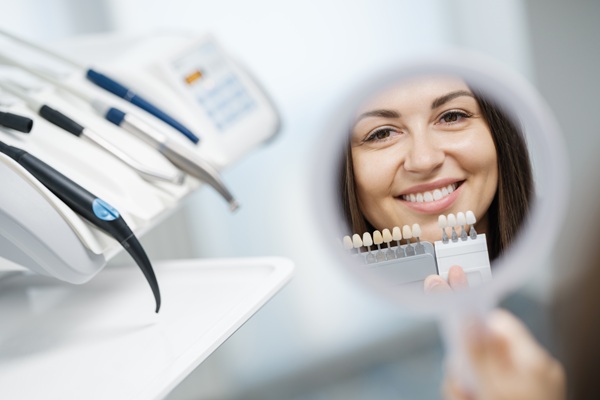 If you are an individual who snores or wakes up gasping for air, a significant other may have suggested visiting a dental or medical provider to investigate the possibility of sleep apnea. A proper diagnosis is crucial for starting the right treatment. There are two main types of sleep apnea that have similar symptoms, but they each originate in a different part of the body.
If you are an individual who snores or wakes up gasping for air, a significant other may have suggested visiting a dental or medical provider to investigate the possibility of sleep apnea. A proper diagnosis is crucial for starting the right treatment. There are two main types of sleep apnea that have similar symptoms, but they each originate in a different part of the body.
What are the 2 types of sleep apnea?
Obstructive and central sleep apnea both result in difficulty breathing while sleeping. Because one involves the airway system itself and the other involves the brain’s signals to this system, selecting the appropriate treatment can be difficult without knowing which type the patient has. Any type of apnea should be carefully evaluated by a medical professional before beginning treatment.
Obstructive sleep apnea
Obstructive sleep apnea can cause loud snoring, a dry mouth in the morning, irritability, and daytime sleepiness. Partners of individuals with this condition may be awakened by excessive snoring. Sleep partners may additionally observe episodes in which the patient suddenly stops breathing while asleep.
Central sleep apnea
Central apnea shares many symptoms with obstructive apnea, but the origin of the disease is the patient’s brain rather than the airways themselves. In central apnea, the interruptions in breathing are due to a miscommunication between the parts of the brain that control the muscles that assist with breathing. These patients effectively stop breathing while sleeping because the brain “forgets” to tell the airways to keep open.
What are the treatments for each type of sleep apnea?
The treatments of each type of apnea depend on the severity of the apnea as well as the age and other risk factors of the patient. Certain medical conditions can increase the risk for both types of apnea, and these preexisting conditions can be useful in making a clear diagnosis.
Treatments for obstructive sleep apnea
Patients who are obese or very overweight are prone to develop obstructive sleep apnea. Individuals who are male, who smoke, and who drink alcohol are at risk for this type of disease as well. Early treatment may involve wearing an oral appliance designed by a dentist for treating apnea. If the patient has a moderate to severe form of the disease, a continuous positive airway pressure mask at nighttime may be considered.
Treatments for central sleep apnea
Central apnea, like obstructive apnea, can also be treated with a CPAP machine. For severe cases that do not respond to the CPAP treatment, patients with central apnea could consider using another type of pressurized air delivery system called adaptive servo-ventilation. Central apnea can also be induced by medication: Several medications, like opioids, can cause symptoms of central apnea. If the patient’s condition allows, these medications can be discontinued to reduce the severity of apnea.
Conclusion
If a patient shows symptoms of sleep apnea, it is better to ask about diagnosing and treating the condition sooner rather than later. Untreated apnea, regardless of type, can lead to poor quality of life as well as sleep.
Request an appointment or call Complete Dental at 559-448-9000 for an appointment in our Fresno office.
Related Posts
Individuals who struggle with symptoms of sleep apnea may not realize the help their dentist can provide by assessing or treating this sleep disorder. Dentists will often ask patients about their sleep habits to assess the possibility of an individual dealing with apnea, though there are other oral health signs that could lead to a…
Unexplained fatigue, loud snoring, dry mouth, and morning headaches are all classic signs of sleep apnea. These symptoms should be taken very seriously, especially among those who fit any of these characteristics:MaleOverweight or obeseOlder in ageLiving with a preexisting medical conditionKnown to have a family history of sleep apneaWhen left untreated, sleep apnea can lead…
If you wake up feeling sleepy, it might be tempting to write it off as just another night, but if it becomes a regular problem, then it may be time to consider sleep apnea as a possible cause of this excessive tiredness. This sleep disorder occurs when breathing starts and stops throughout the night. It…


